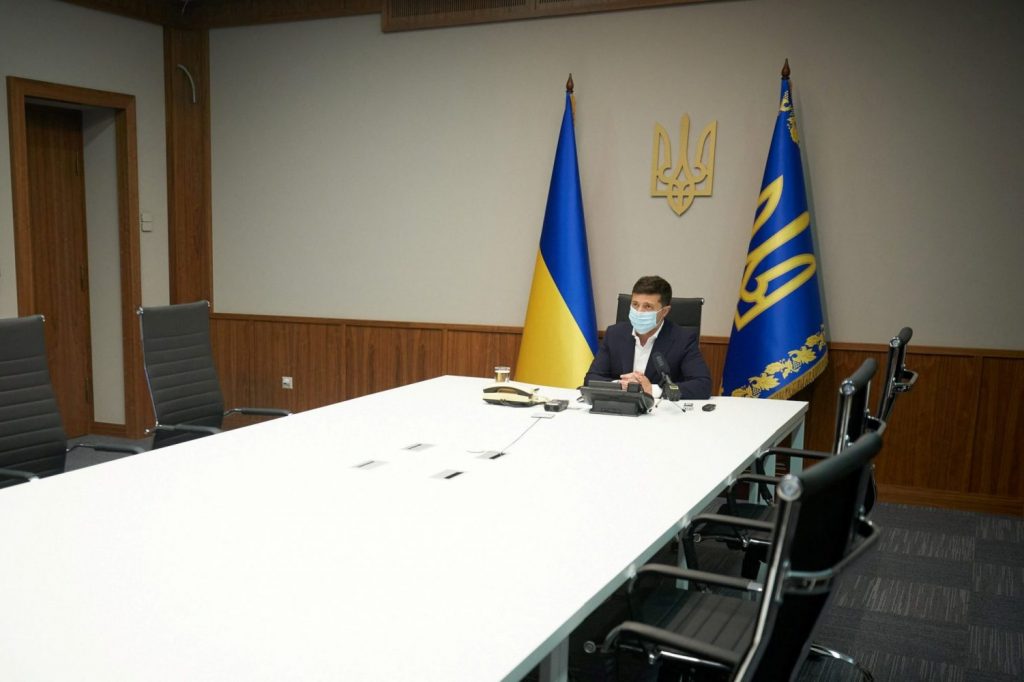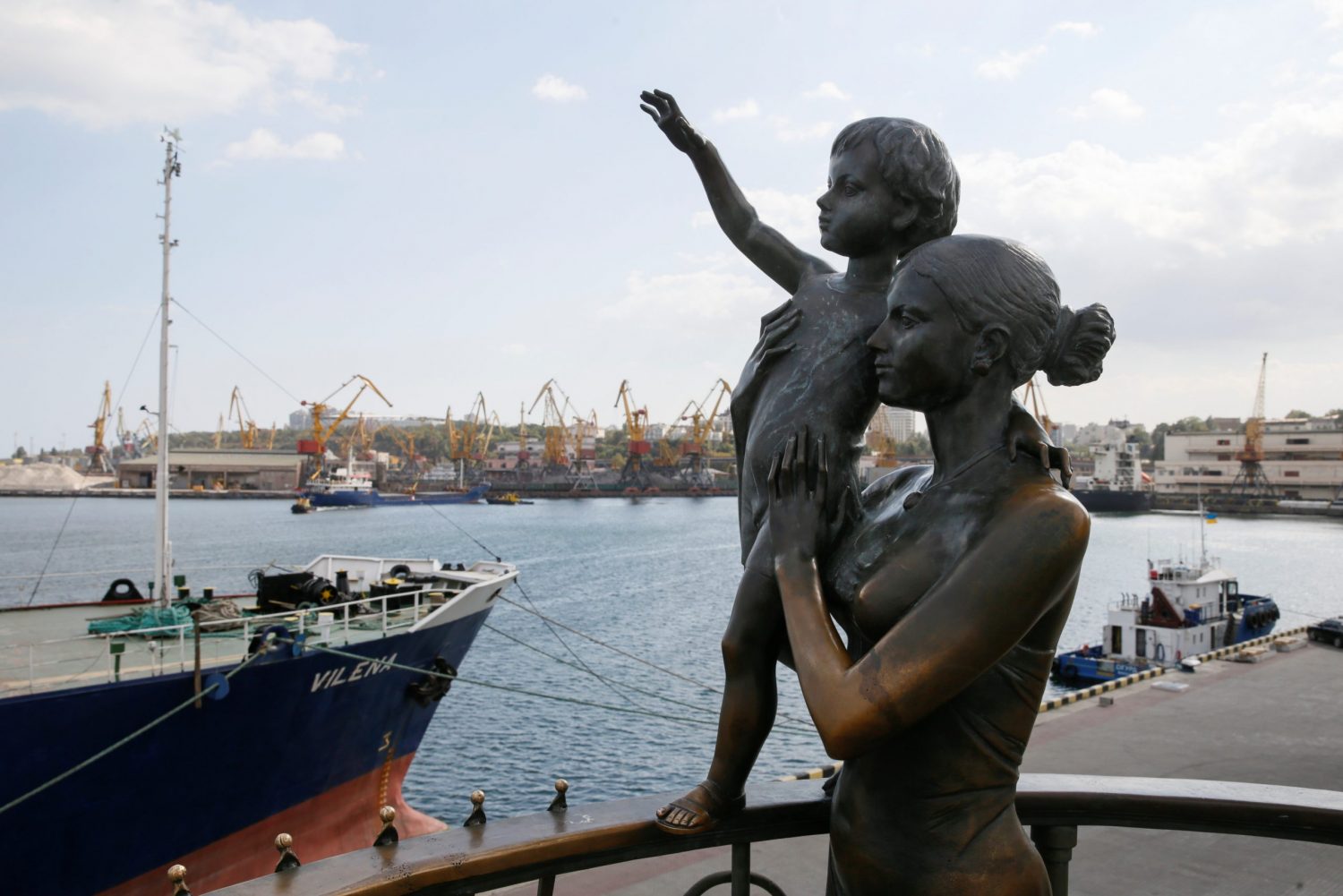At the request of several leading Ukrainian businessmen before the elections in 2019, the Atlantic Council assisted them to work out fifteen key principles for economic policy and judicial reform in Ukraine for the sake of further development of the Ukrainian economy. We presented the principles at a press briefing in Kyiv on September 16 in the presence of most of the businessmen or their representatives. One year after the election of President Voldymyr Zelenskyy, this report assesses what has been achieved, and what remains to accomplish.
In the sphere of law enforcement and judicial reform an impressive purge of the Prosecutor General’s Office has been carried out, and significant progress has been made in judicial reform, and the High Anti-Corruption Court has been formed, while nothing positive has occurred in law enforcement and a sensible law on the security service is badly needed. The question is whether the reform of the Prosecutor General’s Office will persist after personnel changes at the top of this office.
The greatest success in the sphere of economic reforms is the electronic ProZorro procurement and sales. Significant but incomplete steps have been taken in most areas, such as agricultural land market reform, gas and electricity markets, in the tax and customs system, transparency in company ownership, corporate governance of the state companies, and implementation of the Association Agreement with the European Union. The independence of the central bank has so far been respected. In other areas, little or no progress is noticeable, such as the digitization and simplification of the state administration, the improvement of the functioning of the Anti-Monopoly Committee, and privatization.
The fifteen principles, attached at the end of this report, reflect a broad reform consensus in Ukraine that is by no means limited to the business community. The two imperatives behind these principles are the creation of well-functioning markets and the protection of private property rights. These ideas are not intended to be original, but consensual. They represent what is most important for Ukraine’s economic development and, by and large, they coincide with the declared aims of the new Ukrainian government.
One group of principles concerns the rule of law. They call for a reform of the Prosecutor General’s Office, stronger judicial reform that ensures the integrity of judges, the abolition of the economic crimes department of the security services, and the completion of the anti-corruption bodies. They also advocate strict conflict-of-interest rules for public officials and parliamentarians.
Most of the declaration deals with standard market economic reforms. The focus lies on structural reforms, such as the unification and marketization of energy prices, the abolition of unregulated monopolies, the elimination of obsolete regulations and inspections, and transparent and competitive public procurement and sales. As expected, all demand the simplification and improvement of the tax and customs systems. Macroeconomic issues are no longer high on the agenda, while the need for maintained independence of the National Bank remains.
Business leaders also support the legalization of private sales of agricultural land and privatization through transparent and competitive auctions of non-strategic state assets. They advocate that the ultimate beneficial owners of enterprises and other assets of significance be made public—and once made public, recognized as legitimate owners.
The only international issue mentioned is a desire for European integration. Business leaders wanted to stay out of politics, so the declaration contains no political items. On the contrary, the signers concluded that they aspired to conditions such that leading businesspeople would no longer have to go into politics to defend their legitimate rights.
The businessmen who supported this declaration were (in alphabetical order in English): Rinat Akhmetov, Vitaliy Antonov, Oleh Bakhmatiuk, Halyna and Oleksandr Gerega, Vitaliy Haiduk, Vasyl Khmelnytsky, Borys Kolesnikov, Yuriy Kosyuk, Vadym Novynskyi, Serhiy Taruta, Serhiy Tihipko, Oleksiy Vadaturskyi, and Mykola Zlochevskyi.
What Has Been Accomplished in the First Year of President Zelenskyy’s Term?
On April 21, 2019, Volodymyr Zelenskyy was elected president of Ukraine for five years in a second round with no less than 73 percent of the votes. He was inaugurated on May 20, but he faced an already-sitting parliament controlled by the opposition. The logjam was broken by early parliamentary elections held on July 21 that gave Zelenskyy’s new Servant of the People party an absolute majority. When the new parliament gathered on August 29, it appointed a new government, in which only two prior ministers remained. A period of intense legislative activity called the turboregime ensued.
On March 4, 2020, Zelenskyy surprised everybody by sacking Prime Minister Oleksiy Honcharuk and replacing his government with largely unknown ministers. Only six ministers from his first government stayed on and several posts were left vacant. On March 5, Prosecutor General Ruslan Ryaboshapka, who was highly praised by supporters of the rule of law, was sacked. In parallel, since February 24, global financial markets destabilized by the coronavirus pandemic and governmental change dragged Ukraine into the maelstrom of the global financial crisis. Before the end of March, two key new ministers, of finance and health care, were replaced, which boosted the credibility of the new government. Meanwhile, a new minister of economy, trade, and agriculture was appointed, as well as an acting minister of energy.
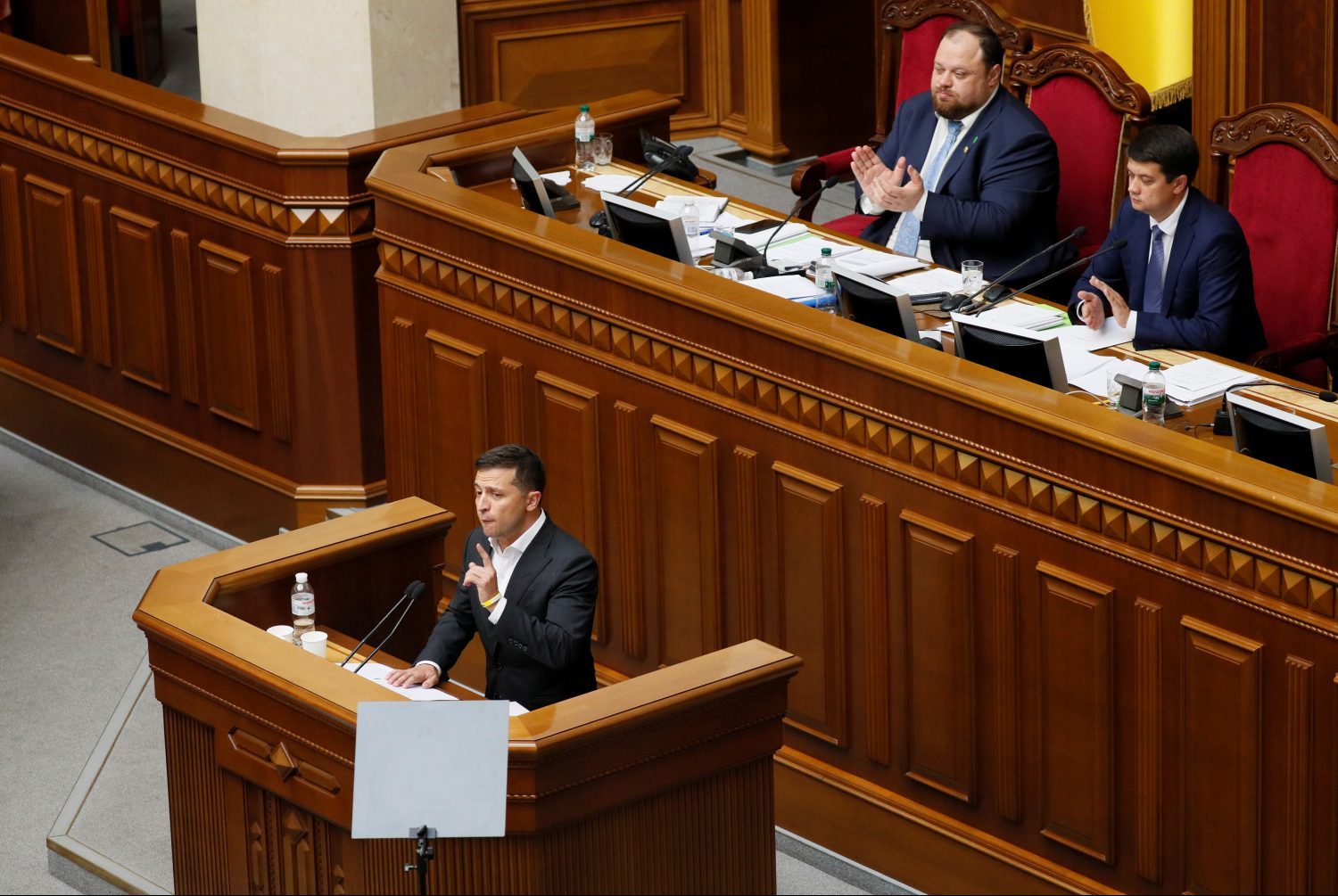
Ukraine’s newly-appointed Parliamentary Speaker Dmytro Razumkov and politician Ruslan Stefanchuk listen to President Volodymyr Zelenskyy during the first session of new parliament in Kyiv, Ukraine August 29, 2019. REUTERS/Gleb Garanich
The first year of Zelenskyy’s term falls into two very different parts economically. Until early March 2020, everything went smoothly. Inflation plummeted from 10 percent to 3 percent. Concomitantly, ten-year sovereign Eurobond yields fell from 11 percent to 4 percent. The budget deficit stayed moderate at just over 2 percent of gross domestic product (GDP), and the public debt declined from 80 percent of GDP in 2016 to 50 percent of GDP at the end of 2019. The current account deficit stopped at 2 percent of GDP, and it was more than covered by remittances from Ukrainians working abroad. Ukraine’s international reserves rose to $26 billion, more than at any time since 2012. The Ukrainian hryvnia appreciated by 17 percent against the US dollar in 2019, but that shocked exporters and depressed GDP growth in the fourth quarter of 2019.1Dragon Capital, Macroeconomic Outlook for 2020-2021, Kyiv, January 27, 2020; Ukrstat.org.
Economic performance was uneven. In 2019, real GDP grew by 3.2 percent despite a poor last quarter due to falling international steel prices. Industrial production decreased by 0.5 percent, which businesses blamed on the great appreciation of the hryvnia. The domestic economy, by contrast, developed well. Construction expanded impressively by 20 percent in real terms, and retail sales by 12.5 percent, reflecting large increases in real wages. Agricultural output increased by only 1.1 percent, but Ukraine had its largest grain harvest ever.2Ibid.
In the review below, the measures requested by the business community are followed by a summary of what has been accomplished in the first year of Zelenskyy’s presidency.
Reforms of Law Enforcement and Judiciary
1. The fundamental problem in Ukraine is that law enforcement does not work appropriately, so that private property rights are not protected. The Prosecutor General’s Office should be deprived of its excessive powers deriving from Soviet times, and the reform of the prosecution should be redone to guarantee its competence, integrity, and independence from political influence.
This was the signers’ most important demand. The Prosecutor General’s Office has persistently been seen as a den of extortion. Prosecutors did their investigative job, but after they had concluded a case, they often did not prosecute but sought out the purported culprit to extort him or her, often with success. Prosecutors lacked both competence and integrity.
In the fall of 2016, all public officials, including prosecutors, were compelled to deliver e-declarations of their assets and incomes. Many prosecutors resigned to avoid revealing huge discrepancies between their official incomes and actual assets.
At the end of August 2019, reformer Ruslan Ryaboshapka was appointed prosecutor general. He quickly hired three deputies renowned for being upright and courageous. The new team swiftly carried out a major purge of prosecutors. All prosecutors had to pass both a competence and integrity test. About half failed and had to leave the service.
When Ryaboshapka was ousted on March 5, 2020, his three deputies were also forced out. While the reforms carried out in the Prosecutor General’s Office until then were impressive, it remains to be seen whether the competence and integrity of the prosecutors will be preserved.
An impressive purge of the Prosecutor General’s Office has been carried out, but the question is whether it will persist after personnel changes at the top.
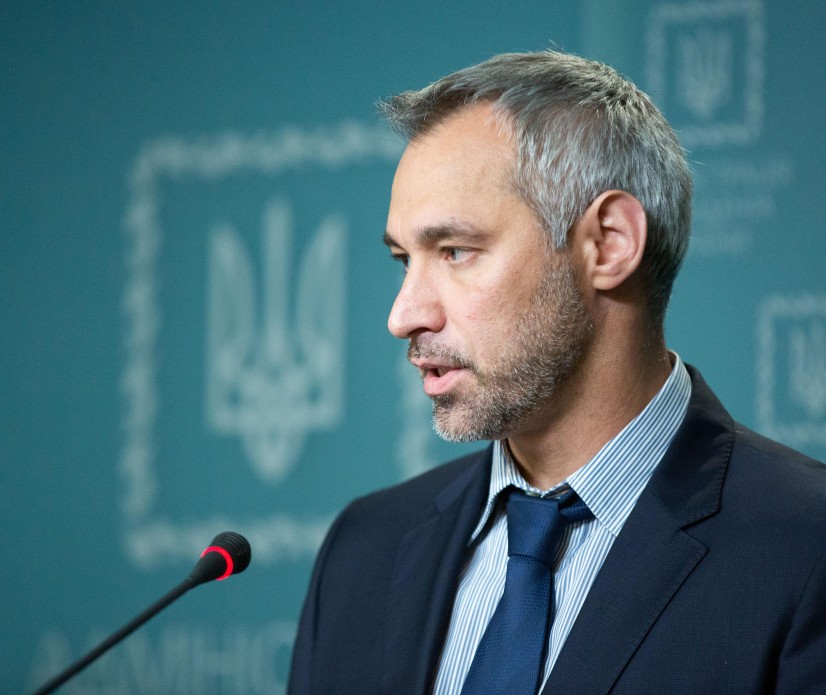
An impressive purge of the Prosecutor General’s Office has been carried out, but the question is whether it will persist after personnel changes at the top.”
Former Prosecutor General Ruslan Ryaboshapka was removed from office in March, 2020. Source: President of Ukraine.
2. The judicial reform needs to be adjusted so that only judges of verified integrity can be allowed to serve.
Ukraine carried out a major judicial reform under former President Petro Poroshenko meant to ensure the competence and integrity of judges, just as was later done with prosecutors. The e-declarations in the fall of 2016 convinced one-fifth of the judges that they had better leave their jobs because of blatant lack of integrity.
The selection of a new Supreme Court of 200 judges took a long time. A wide range of lawyers were entitled to apply and underwent serious tests of competence and integrity. Yet, a couple of self-governing judicial bodies notorious for their resistance to reform obstructed the process at every turn, and the drawn-out selection process was not completed until the spring of 2019. The shocker was that forty-four of the 193 Supreme Court justices that Poroshenko eventually appointed had failed the integrity test.3Olena Markarenko, “Recent Outrageous Decisions of Ukraine Courts Prove Zelenskiy Inherits Limping Judicial System,” Euromaidan, July 30, 2019. http://euromaidanpress.com/2019/07/30/recent-outrageous-decisions-of-ukraine-courts-prove-zelenskiy-inherits-limping-judicial-system/.
Zelenskyy set out to rectify the situation. In November 2019, he signed a judicial reform law aimed at firing tainted judges and creating credible judicial institutions. He did so by cutting the number of Supreme Court justices from 200 to 100. The necessary follow-up legislation, however, was never adopted.4Oleg Sukhov, “Constitutional Court Cancels Most of Zelensky’s Judicial Reform,” Kyiv Post, March 12, 2020. https://www.kyivpost.com/ukraine-politics/constitutional-court-cancels-most-of-zelenskys-judicial-reform.html.
In March 2020, the Constitutional Court nullified most of Zelensky’s judicial reform, claiming that several clauses were unconstitutional. The Kyiv Post report says it all:
Specifically, the Constitutional Court took issue with the ethics commission that was supposed to fire members of the High Council of Justice — the judiciary’s highest government body — and the High Qualification Commission — which vets, hires, and fires judges — if they violated the law or standards of ethics and integrity. The Constitutional Court abolished the ethics commission, saying that its powers are not based on the constitution.5Ibid
The Constitutional Court suffers from a poor reputation. In October 2010, it even abolished the constitution at the behest of former President Viktor Yanukovych. As the Kyiv Post reports: “According to records in Yanukovych’s Party of Regions’ alleged off-the-book ledger, judges from the Constitutional Court received $6 million from the Party of Regions for making rulings that helped Yanukovych usurp power. They deny the accusations of wrongdoing.”6Ibid
With several of its justices appointed by Yanukovych, this court is seen as a holdover of the worst of the Ukrainian judicial system. It desired neither new, honest, and qualified foreign judges nor the ouster of incumbent, corrupt Ukrainian judges. Its excuse was the poorly composed Ukrainian constitution, which it interprets.
The Constitutional Court has left Ukraine’s judicial system a mess. The logical next step would be to purge the Constitutional Court and appoint judges of integrity and competence. Another logical step would be to adopt a new law on the judicial system to mend the damage caused by the current Constitutional Court. Meanwhile, businesspeople report that many, but not all, courts have become more professional, and there is some semblance of the rule of law. They complain, though, that judges known to be corrupt remain on the bench in lower courts.
While significant progress has been made in judicial reform, the designers should go back to the drawing board to get the legislation and the institutional structure right.
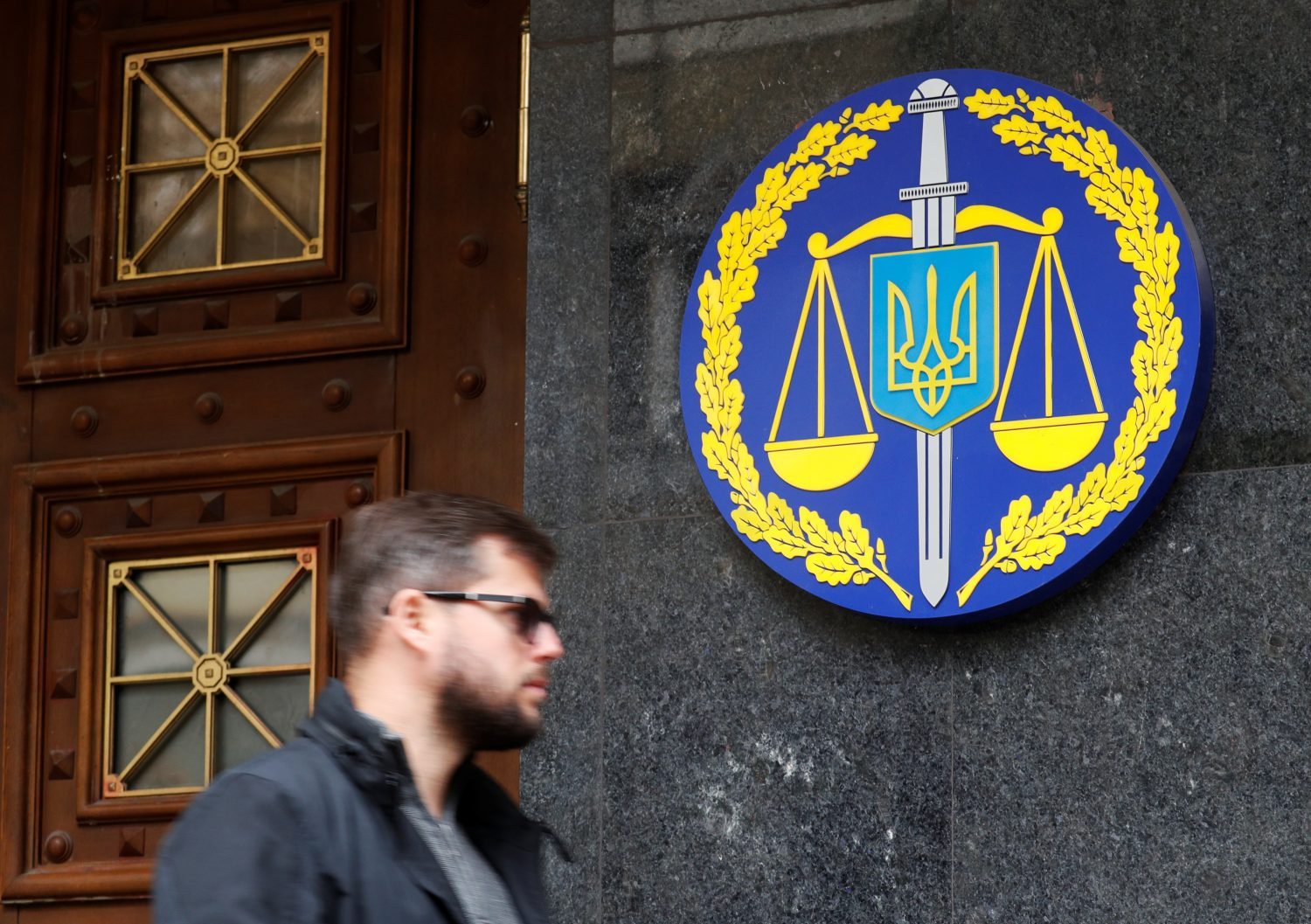
Nothing positive has occurred in law enforcement and a sensible law on the security service is badly needed.”
A man walks near Ukraine’s Prosecutor General’s Office in Kyiv, Ukraine October 4, 2019. REUTERS/Valentyn Ogirenko
3. Law enforcement agencies should work for the rule of law and not act as organs of corporate raiding. In particular, the department of economic crime of the Security Service of Ukraine (SBU) should be abolished. The SBU should not deal with economic crimes.
In contrast to major progress in prosecution and significant improvements in the courts, little can be said about law enforcement that is positive. A draft law on the SBU has long been languishing in parliament. A major idea is that responsibility for dealing with financial crimes be taken from the SBU and transferred to a new, specialized agency. The SBU continues to operate as before and is accused of engaging in corporate raiding. The parliament needs to adopt a law on the SBU to finally establish a legal basis for a security service that would concentrate on counterespionage and refrain from corporate raiding and illegal eavesdropping.
When we discussed this with businesspeople in the first half of 2019, the ordinary police were not seen as a significant concern. Alas, the early patrol police reform has dissipated. While the police are less troublesome than other branches of law enforcement, policemen are once again accused of stopping ordinary drivers to request minor bribes.
In one area of law enforcement, significant deterioration is apparent. The novel State Bureau of Investigation, which was supposed to correspond to the American Federal Bureau of Investigation (FBI), has brought up dubious cases of a seemingly political nature. Clearly, this agency has not started off as it should and needs radical reform.
Nothing positive has occurred in law enforcement and a sensible law on the security service is badly needed.
4. Anticorruption bodies need to be completed. A truly independent Anticorruption Court of real integrity should be established, the National Anticorruption Bureau of Ukraine (NABU) should be protected, the National Agency on Corruption Prevention (NAZK) should be reformed so that it can start operating, and an effective anticorruption prosecutor needs to be appointed.
At the strong urging of their Western partners, Ukrainian authorities have set about building an alternative law enforcement system to address corruption. The initial success of the investigative body, the National Anti-Corruption Bureau of Ukraine (NABU), continues, though it increasingly faces objections about how it operates. Neither the National Agency on Corruption Prevention (NAZK) nor the special anti-corruption prosecutor has functioned well, but these two institutions have been seen as of secondary importance.
The main policy issue, after NABU’s establishment, has been setting up the High Anti-Corruption Court, which started working September 5, one week after the new government was appointed. The law establishing the court was adopted in June 2018. Nearly a year later, in April 2019, Poroshenko selected thirty-eight judges to the court and its appeals chamber.7“High Anti-Corruption Courts Starts Work in Ukraine: How Will It Operate?,” Ukraine Crisis Media Center, September 6, 2019, https://uacrisis.org/en/73207-high-anti-corruption-court.
The High Anti-Corruption Court has been formed according to rules of competence and integrity, though it remains to be seen whether it really works and will be respected.
Economic Reforms
5. Energy prices should be unified and determined by real markets that should be established as soon as possible.
For oil and coal, markets already existed, so natural gas and electricity are the concerns. Ukraine has carried out major reforms in the energy sector since the Revolution of Dignity. Most importantly, gas prices for consumers were gradually raised from 2014 to market levels in 2016, eliminating the corrupt arbitrage between low state-controlled prices and several-times-higher market prices. That, in turn, eliminated 6 percent of GDP in essentially corrupt gas subsidies.
The price hike caused some political blowback for the government, but the recent collapse of global oil and gas prices quieted things. European gas prices have fallen from around $400 per one thousand cubic meters in 2013 to $80, allowing the government to cut consumer prices in line with market prices. Yet, in spite of adopting a law on a gas market in April 2015, Ukraine has so far established it only partially.8Agha Bayramov and Yaroslava Marusyk, “Ukraine’s unfinished natural gas and electricity reforms: one step forward, two steps back,” Eurasia Geography and Economics, vol. 60 (2019), 1:73-96. https://www.tandfonline.com/doi/full/10.1080/15387216.2019.1593210.
The Ukrainian Rada adopted a law setting up the National Energy and Public Utilities Regulatory Commission (NEURC) on September 22, 2016, and the Law on the Electricity Market on April 13, 2017,9The European Union et al., Ukraine’s Electricity Market Transformation, Kyiv, June 2017,http://enref.org/wp-content/uploads/2017/07/Power-Market-Holikova_ENG.pdf. both key to deregulating the electricity market. The Law on the Electricity Market came into force on July 1, 2019, but, so far, only a partial market has developed, applying only to electricity generated by thermal power stations, which are predominantly private. Four other kinds of electricity are regulated differently: Solar and wind energy, which are entirely private, benefit from very high state green tariffs, while dominant state-produced nuclear power and hydropower are sold at very low tariffs.
Partial gas and electricity markets have been established, with the electricity market reaching a major milestone in July 2019. So far, though, both markets remain partial and controversial.
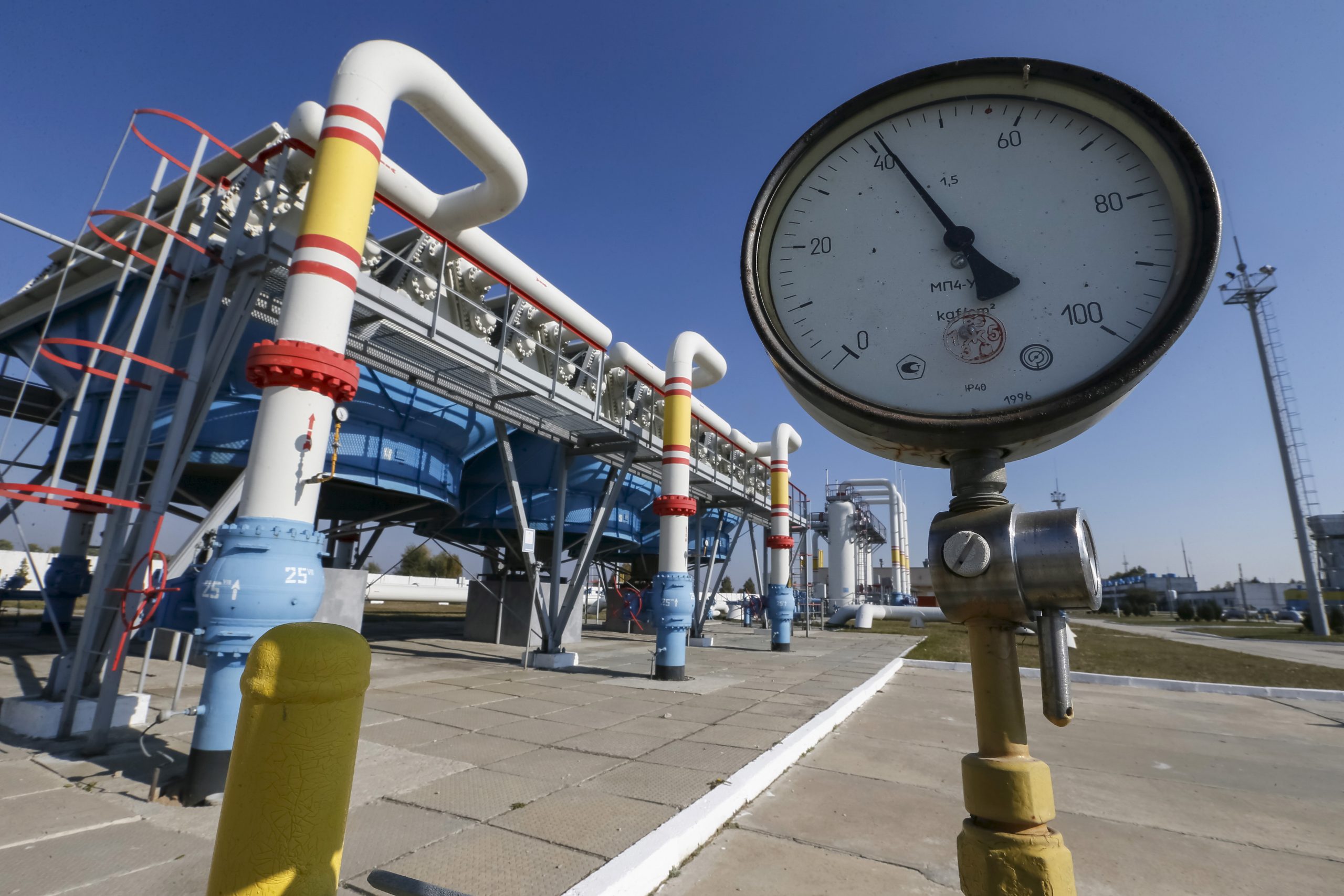
A pressure gauge is seen at a gas compressor station and underground gas storage facility in the village of Mryn, north of Kiev, Ukraine, October 15, 2015. Ukrainian energy ministry actions are putting at risk a $300 million loan from the European Bank for Reconstruction and Development, Ukrainian Prime Minister Arseny Yatseniuk said on Thursday. The EBRD approved the loan in September for the purchase of gas from Europe. REUTERS/Gleb Garanich
6. Harmful and outdated regulations, inspections, and inspection agencies should be abolished. All remaining unregulated monopolies should be eliminated, and an effective competition policy be pursued.
Ukraine has been climbing up the standings in the World Bank’s Ease of Doing Business index, a standard measure of the burden of regulation. It has risen from number 152out of 190 countries, in the dark year of 2011, to sixty-four. Issuing construction permits and registering property are particular bright spots, although nearly every category has improved a bit. More stubborn has been the country’s insolvency process, which puts creditors through a lengthy and expensive ordeal to recover any of their funds. This has harmed banks in particular.10Doing Business 2020, World Bank, October 24, 2019, https://www.doingbusiness.org/content/dam/doingBusiness/country/u/ukraine/UKR.pdf.
The potentially biggest step in the European Union (EU) Association Agreement is that Ukraine committed itself to accept EU technical standards from the beginning of 2019. For various bureaucratic reasons, however, this useful rule opening the Ukrainian market to broader competition has not yet come into force. In effect, Ukraine maintains the old Soviet standards, and since Russian products are by and large sanctioned or otherwise not available, Ukrainian companies often face only one—Ukrainian—supplier.
The Anti-Monopoly Committee does not promote competition but hinders it. All kinds of enterprise purchases are subject to checks by the Anti-Monopoly Committee, which typically take up to three months and makes no sense for small and medium-size companies, which are too small to be monopolies. The Anti-Monopoly Committee should focus on promoting competition, not on hindering it.
A broader concern is the malfunctioning of the Ukrainian state administration. The government formed in August 2019 included a sorely needed deputy prime minister for digitization. There has been much talk about Ukraine wanting to adopt an Estonian e-government in an iPhone, but little has happened. Major documents still require thirty physical signatures,feeding bureaucracy while diluting responsibility. Often, physical letters with stamp and signatures are required.
Yet, businesspeople complain less about various inspection agencies than law enforcement agencies. The general burden appears to have eased, but the Ukrainian state administration remains far too complex.
Ukraine needs to move ahead with digitization of the state administration, and the Anti-Monopoly Committee needs to move from raising administrative barriers to promoting competition.
7. Public procurement and public sales should be transparent, competitive, and subject to electronic bidding.
One of the most publicized achievements of the Revolution of Dignity has been the automated ProZorro public procurement system introduced in 2016, now used for most public procurement and sales. The idea is simple: open, transparent purchases and sales through an electronic platform to which all have access. ProZorro has become widely used and saves Ukraine around $1 billion a year in more economical public purchases. It also reduces corruption in these interactions between the public and the private sector.
Many purchases and sales, though, do not lend themselves to ProZorro’s straightforward procedures. For example, the system has difficulty with sales from the Deposit Guarantee Fund, which holds collateral from banks that have failed. Because this collateral is often unfinished construction assigned unrealistically high values, these auctions usually fail.
Nor is ProZorro very useful for purchasing consultancy services. The buyer knows what quality is desired, but low-quality competitors presume that Ukrainian courts do not, and turn to them to claim that they should win over top-level international consultants. They often prevail in court, causing years of delays.
By and large, the electronic ProZorro procurement and sales platform functions well, but the system needs some refinement to avoid bureaucratic complications
8. Non-strategic state assets should be privatized through transparent and competitive auctions, while proper corporate governance with independent supervisory boards should be established at the remaining large state companies.
As two authors put it, the “Ukrainian history of privatisation looks like a never-ending story of losses with only a few remarkable successes.” In 2016, Ukraine still had 3,445 state-owned enterprises, though half of them were not operating. By the end of 2019, that number had shrunk only slightly, to 3,243. Privatization almost stopped after the Revolution of Dignity, not from a socialist commitment to public ownership but because of public suspicion of graft and corruption in the process.11Bohdan Prokhorov and Dmytro Yablonovskyy, “Large And Small. The Path of Privatization from Failure to Transparency,” Vox Ukraine, December 5, 2019,
https://voxukraine.org/en/large-and-small-the-path-of-privatization-from-failure-to-transparency/.
Time and again, the government has listed companies to be privatized, but privatization attempts have almost always failed. Usually, the government tries to sell the most valuable companies, but tacit stakeholders who are not prepared to give them up frequently persist. Often, the government has set unrealistically high minimum prices, possibly in the hope that an auction would fail.
In March 2018, a new privatization law came into force that simplified the classification of assets to privatize. The practical consequence of this law was that it became possible to carry out small-scale privatization, which has proceeded through the state Prozorro electronic bidding platform since August 2018.12Ibid.
Traditionally, the government has forbidden privatization of a long list of companies, but in early 2020, the ban was lifted for all but obviously strategic companies.13“Ukraine Approves List of Strategic Enterprises Not Subject to Privatization,” Ukrinform, January 15, 2020, https://www.ukrinform.net/rubric-economy/2856430-ukraine-approves-list-of-strategic-enterprises-not-subject-to-privatization.html. In November 2019, Zelenskyy ordered 500 state enterprises to be sold by the State Property Fund, which then named twenty large companies for priority sale. Yet, the government has still failed to sell any large enterprise in an equitable auction since 2005.14Olena Markarenko, “Ukrainian Government Sets Ambitious Goals for Privatization of State Enterprises,” Euromaidan, December 12, 2019, http://euromaidanpress.com/2019/12/20/ukrainian-government-sets-ambitious-goals-for-privatization-of-state-enterprises/.
Another track has been to try to improve the corporate governance of state corporation that either could not be privatized for strategic reasons (e.g., railroads and pipelines) or could not be profitably privatized for long. The idea that the government elaborated since 2014, together with the European Bank of Reconstruction and Development, was to establish independent supervisory boards with a majority of independent directors in a dozen of the biggest state corporations. In 2018, Ukraine adopted a set of principles for state-owned enterprises defining their operational goals and spelling out the rationale for their continued state ownership.15Prokhorov and Yablonovskyy, “Large And Small.”
Ukraine has made major headway in the corporate governance of major state-owned companies. A dozen major state-owned companies now have supervisory boards with a majority of independent directors, but the generous market-rate fees and salaries paid to attract competent directors and executives have caused populist protests. Moreover, supervisory boards dominated by foreigners have sometimes either kept executives the government wanted to sack or sacked executives favored by the government. These matters are not simple, but they do show that the corporate governance reform of the state-owned companies has had real impact. The foremost success is Naftogaz, which both won very complicated legal cases against Gazprom for tens of billions of dollars and eliminated annual gas subsidies of about 6 percent of GDP each year.16As a matter of disclosure, I am a member of the supervisory board of the Ukrainian Railways, Ukrzaliznytsiya.
In order to ease fears that peasants would be swindled out of their property or that big businesses would buy it up cheaply, Ukraine imposed a moratorium on the sale of agricultural land, in violation of the constitution. This moratorium was prolonged one or two years at a time until March 31, 2020, when the Rada lifted it.

The new law has allowed trade in agricultural land, and its slow start should reduce concerns about major disruptions.”
Grain is loaded at a shipment terminal in the southern Ukrainian city of Mykolaiv, which serves as one of the great gateways to Ukraine’s fabled agricultural breadbasket. REUTERS/Vincent Mundy
The new law on a land market will allow Ukrainian citizens to dispose of and acquire privately owned agricultural land, but, to persuade the parliament to adopt this law, the government offered substantial concessions.
First, land purchases will be allowed only beginning in July 2021. Second, until 2024, no one is permitted to accumulate land of more than 10,000 hectares. Third, a ban on foreign nationals directly acquiring and owning agricultural land in Ukraine remains in place. Fourth, the remaining state land, some seven million hectares, will not be sold off for the next three years.
Only foreign nationals owning companies that already operate agricultural enterprises in Ukraine may acquire agricultural land until 2024, subject to the approval of a national referendum likely to be held on the issue. Ukrainian banks and banks with foreign capital will be allowed to acquire agricultural land through foreclosures, but they must sell it within two years.17Kostiantyn Likarchuk, “Ukrainian parliament approves lifting ban on the sale of private agricultural land,”Kinstellar, April 1, 2020, https://www.lexology.com/library/detail.aspx?g=19960d68-27ba-47d6-b81b-8f3f2fa1bd06.
The new law has allowed trade in agricultural land, and its slow start should reduce concerns about major disruptions.
10. The tax and customs systems should be as simple as possible, as well as transparent and lawful, making sure that all pay taxes.
Tax and customs systems are central for the functioning of the state. They should collect substantial revenue with as little administrative cost as possible. The World Bank’s Ease of Doing Business index has recorded steady progress. Ukraine ranks sixty-fifth of 190 for ease of paying taxes and seventy-fourth for ease of trading over borders.18Doing Business 2020, World Bank. Decent, but not impressive, rankings by international standards.
Big businesses greatly appreciate the improvements in the tax system. Once-frequent complaints about tardy value-added tax refunds, for example, are rarely heard since the system underwent a substantial computerization over the past several years. Nor are tax audits, which used to be a real curse, much talked about any longer.
Customs, however, is still subject to a lot of criticism. A widespread suspicion is that some kind of organized crime, rather than official customs authorities, is really in charge. The president himself has complained about declining revenues, but much of that can be explained by the much-higher exchange rate of the hryvnia, which reduces the value of imports in hryvnia.
On April 24, the Cabinet of Ministers suddenly sacked the highly respected heads of both the customs and tax services, as well as their chief deputies. Unfortunately, the first indication of what was going on was that the much-appreciated automatic refunds of VAT for exporters ceased, suggesting that some old corrupt interests had won.
Significant improvements have been recorded in the tax system, as well as the customs system, in recent years. The sudden sackings of leaders of good repute in these agencies are worrisome.
11. The ultimate beneficial owners of all enterprises and other assets of significant value in Ukraine should be publicly declared.
Ukraine has made major headway in declaring the ownership of major assets, most notably in the banking industry. The National Bank of Ukraine has successfully required that all banks declare their ultimate beneficiary owners. E-declarations have disclosed much more. Still, thousands of enterprises are owned by unknown offshore companies, and they should be declared. The most striking exception to this new wave of transparency is the ownership of Ukrainian television companies.
Ukraine has brought about great transparency in company ownership. It should complete this process.

Ukraine finally needs to recognize the actual owners of private assets.”
A woman uses her smartphone as a man uses an ATM machine of Privat Bank in Kyiv, Ukraine October 25, 2018. REUTERS/Gleb Garanich
12. Given the absence of prior asset declarations and the large gray economy, after ownership of enterprises and other assets have been declared, their legitimacy should be honored.
A major request of big businesses is that their ownership be recognized once they have declared their assets. It’s a reasonable request, given that the government cannot expect to tax prior profits. The Ukrainian state needs to know all ultimate beneficiary owners, who in turn need their ownership recognized so that they feel free to operate, invest, and sell. This would cost the Ukrainian state nothing, while reassuring Ukrainian businesspeople and potential investors.
Ukraine finally needs to recognize the actual owners of private assets.
13. The independence of the National Bank of Ukraine (NBU) should be maintained.
The national bank came under substantial criticism, including from members of the government, particularly in the second half of 2019. Critics had three primary concerns.
First, since June 2014, it has closed down or seized 104 of Ukraine’s then-180 commercial banks. The errant banks had given their owners large loans that had not been repaid, lacked sufficient capital, or had engaged in money laundering. So far, the central bank has held its ground with strong support from international financial institutions, notably the International Monetary Fund (IMF).
Second, the NBU has maintained too-high interest rates. Ukraine has long needed to maintain high interest rates to fight inflation, but inflation fell sharply in the second half of 2019. The bank started lowering rates in the summer of 2019, but not fast enough, which led to an excessive appreciation of the hryvnia in late 2019.
The business community’s main concern, especially that of exporters, was that high Ukrainian interest rates and domestic treasury bond yields attracted some $5 billion in speculative foreign money to domestic treasury bonds toward the end of 2019. This capital inflow drove the hryvnia up by no less than 17 percent against the US dollar, helping to depress industrial production in the fourth quarter.
The actions of the NBU have been contentious, but the independence of the central bank is a value in itself and so far it has been respected.
14. Strict rules for conflict of interest for both public officials and parliamentarians should be established and enforced.
In the last year, nothing has been done to prevent conflicts of interest for elected and non-elected public officials. Fortunately, the e-declarations launched in the fall of 2016 have done much to address this. Officials continue to report their incomes and assets every month in the electronic reporting system. Since these data are publicly available, they frequently generate complaints, which is as it should be.
Further, in 2020, major steps backwards have been taken. Twice, the government has slashed the already very low salaries of public officials. This policy all too obviously promotes corruption. Public officials need to receive salaries on which they can live without resorting to graft.
Rules of interest need to be clarified and the current very low cap on government officials’ salaries should be lifted, lest they be vulnerable to corruption.
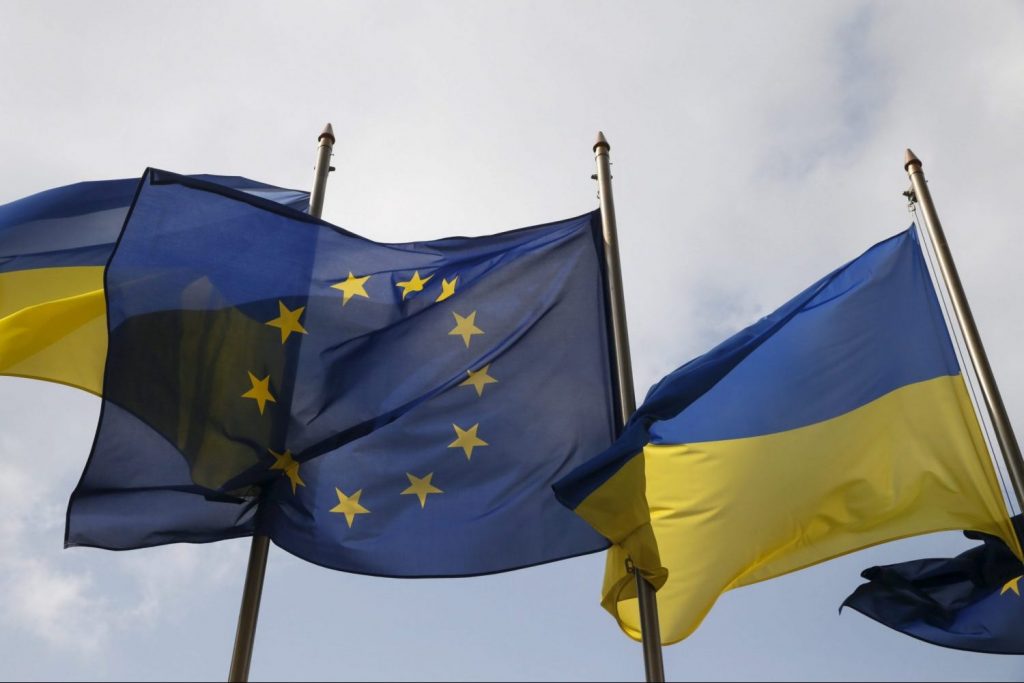
Ukraine has done much to implement its Association Agreement with the European Union and it needs to continue doing so.”
Ukrainian and EU flags fly in front of the Presidential Administration in Kyiv, Ukraine, April 7, 2016. REUTERS/Valentyn Ogirenko
European Integration
15. Ukraine shall pursue European integration through fulfilling the conditions of the Association Agreement with the European Union.
After Russia started its military aggression against Ukraine in early 2014, Ukraine’s main foreign trading partners and commodities have changed. Russia is no longer the all-dominant trading partner: It used to account for about one-third of Ukraine’s foreign trade, but it is now Ukraine’s third-largest export market, taking only 6.5 percent of Ukraine’s exports and providing 11.5 percent of Ukraine’s imports. Instead, the European Union has become the most important trading partner, accounting for 41.5 percent of Ukraine’s merchandise exports and 41.1 percent of its imports. China comes second, with 7.2 percent of Ukraine’s exports and 15.1 percent of its imports. When it comes to Ukraine’s exports, agricultural products and metals each used to account for about 40 percent. Now, metals have sunk to 20.5 percent, while agricultural products have increased to 44.3 percent.19Anders Åslund, “Russia Loses Leverage as Ukrainian Exports Go Global,” Ukraine Alert, Atlantic Council, February 20, 2020, https://www.atlanticcouncil.org/blogs/ukrainealert/russia-loses-leverage-as-ukrainian-exports-go-global/.
This transformation of Ukraine’s foreign trade shows the impact of the Deep and Comprehensive Free Trade Agreement with the EU that was provisionally applied from January 2016 and entered into force on September 1, 2017. Ukraine is swiftly becoming integrated into the European supply chain.
In parallel, Ukraine is implementing the European Association Agreement, which is really a reform program of several hundred pages. It states when and how Ukraine is supposed to carry out many legal and economic reforms. The European Union is providing substantial support, both technical and financial, to facilitate the mutually desired reforms.
Ukraine has done much to implement its Association Agreement with the European Union and it needs to continue doing so.
Anders Åslund is a senior fellow at the Atlantic Council and author of the new book “Russia’s Crony Capitalism: The Path from Market Economy to Kleptocracy.” Follow him on Twitter anders_aslund.
Further reading

The Eurasia Center’s mission is to promote policies that strengthen stability, democratic values, and prosperity in Eurasia, from Eastern Europe in the West to the Caucasus, Russia, and Central Asia in the East.
Image: Ukrainian President Volodymyr Zelenskiy chairs a meeting, by videoconference, on measures combat violations of weight-size restrictions on roads by trucks, in Kyiv, Ukraine June 16, 2020. Ukrainian Presidential Press Service/Handout via REUTERS
